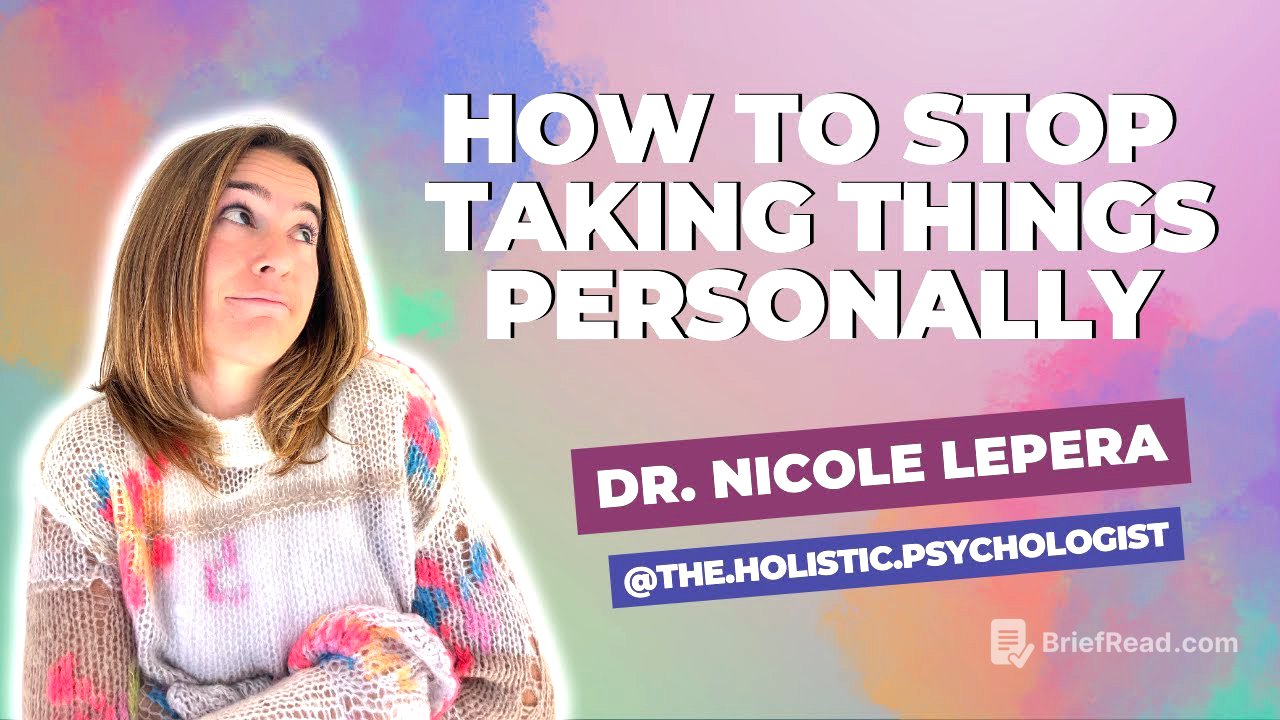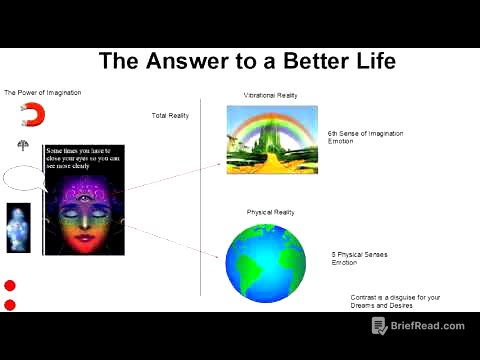TLDR;
This video explains why people take things personally, often linking it to complex trauma experienced in childhood. It highlights how such trauma can hinder the development of a strong sense of self, leading to feelings of shame and an egocentric perspective. The video offers practical steps to break this habit, including stopping the story, asking directly, and using the mantra "This is not entirely about me." These steps aim to foster emotional resilience and reduce overanalyzing, ultimately leading to more peaceful and confident interactions.
- Complex trauma in childhood can lead to taking things personally.
- Developing emotional resilience is key to not personalizing others' actions.
- Practical steps include stopping the story, asking directly, and using a specific mantra.
Intro why we take things personally [0:00]
The video introduces the topic of how to stop taking things personally. It begins by explaining that the tendency to take things personally is often connected to experiences of complex trauma, particularly those occurring in childhood. The discussion sets the stage for understanding the underlying reasons behind this behavior and how it relates to early developmental experiences.
Complex trauma [0:17]
Complex trauma is defined as exposure to overwhelming events, typically starting in childhood and recurring within relationships. Unlike "Big T" trauma, complex trauma involves situations where children are forced to deal with intense emotions alone, lacking emotionally attuned adults to help them process and soothe their feelings. This absence of support hinders the development of self-soothing skills.
Sense of self [1:16]
Experiencing complex trauma can impede the formation of a strong sense of self. Individuals may struggle to understand who they are and their place in the world. This lack of self-awareness contributes to the tendency to internalize and personalize external events and behaviors.
High levels of shame [1:30]
Complex trauma often results in high levels of shame, with individuals believing they are inherently flawed, broken, and unworthy of love. This deep-seated shame reinforces the habit of taking things personally, as negative interactions are seen as confirmation of their perceived worthlessness.
We don't fully mature [1:44]
Complex trauma can stunt emotional maturation, causing individuals to remain in an egocentric or self-focused state. This developmental delay affects how they interpret the actions and behaviors of others, often leading to personalization.
Ego-centric state [1:52]
The video explains that children naturally exist in an egocentric state, believing that everything happening around them is directly related to them. As children mature with secure attachments and emotional needs met, they learn to consider others' perspectives. However, those who experience complex trauma may remain in this egocentric state, interpreting others' actions as personal reflections.
Examples of self-focused state [2:20]
An example illustrates how an 8-year-old might internalize a father's exhaustion and lack of enthusiasm as a personal rejection, rather than understanding it as a result of the father's work-related stress. This demonstrates the egocentric perspective where external behaviors are directly tied to the child's self-perception.
Examples of thinking outside ourselves [3:35]
The video contrasts the egocentric view with a mature perspective, providing an example of encountering an unfriendly clerk at a gas station. Instead of taking the clerk's behavior personally, a person with a developed sense of perspective might attribute it to the clerk's job dissatisfaction or personal struggles, showcasing the ability to look beyond oneself.
Emotional resilience [4:09]
Emotional resilience, the ability to bounce back from negative experiences, is often lacking in individuals who have experienced complex trauma. Without this resilience, people tend to take everything personally, leading to overanalyzing, overthinking, and heightened sensitivity to rejection or hurt.
The truth is [4:40]
The video emphasizes that people's behavior is more reflective of their own feelings about themselves. While interactions can influence others, reactions and behaviors are largely determined by individual communication skills, self-beliefs, and past experiences. Understanding this can bring peace and reduce feelings of being slighted.
Steps to break the habit of taking things personally [5:18]
The video transitions into providing actionable steps to break the habit of taking things personally, offering practical strategies for changing this ingrained behavior. These steps are designed to help individuals develop a healthier, more objective perspective on interactions and relationships.
Stop the story [5:20]
The first step involves stopping the stories that the brain creates to provide certainty and safety. The video highlights that these stories are not always true and can cause issues in relationships. By noticing and acknowledging the stories, individuals can begin to question their validity and avoid reacting as if they are absolute truths. For example, if someone doesn't text back, instead of assuming disinterest, recognize that the assumption is a story.
Ask directly [7:06]
The second step encourages asking directly instead of assuming. This is particularly important for those with complex trauma, who may avoid direct communication due to fear of conflict. Asking direct questions fosters closer relationships, sets boundaries, and provides clarity by giving others the opportunity to explain their actions or behaviors.
Use this mantra [7:44]
The third step involves using the mantra "This is not entirely about me." This tool helps create new neural pathways, reinforcing the understanding that not every interaction is solely about oneself. By reminding themselves of this mantra, individuals can consider that other people's stress levels, backgrounds, and beliefs influence their behavior, leading to less reactive and more grounded responses.
Share in the comments "What was the most helpful aspect of this video." [9:27]
The video concludes by encouraging viewers to share the most helpful aspect of the video in the comments, promoting engagement and reflection on the content. It reinforces the idea that breaking the habit of taking things personally is a learned skill that can lead to increased confidence and reduced reactivity.









